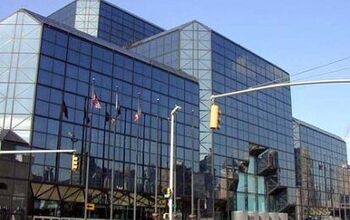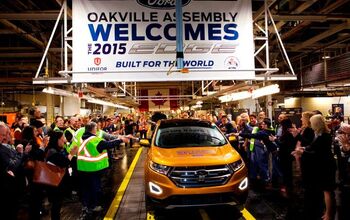Ford Workers: Hell No, We Won't Go
The Detroit Free Press claims to have access to the results of Ford’s most recent buyout program, designed to downsize the ailing automaker, and they ain’t good. “Despite an aggressive [and expensive] campaign by Ford Motor Co. to get more autoworkers to leave the company through a voluntary job buyout program, fewer than 3,000 of Ford’s 60,100 autoworkers in North America have decided to go.” In case you missed the meaning of that failure to entice a posse of Blue Oval Boyz to blow town, the Freep sums-up the situation succinctly. “Ford already has lost $8.6 billion through the first half of the year, and it needs to shed workers as quickly as possible to reduce its costs, as global demand for its cars and trucks continues to shrink in the suffering economy.” Even though Ford’s fighting for its survival, the workers’ reluctance to cut bait and fish is understandable; where the Hell are they going to get a job these days? “They can stay and risk their job being eliminated,” analyst Aaron Bragman opined. “Or, they can try to find a new job in one of the worst job markets in years.” In other words, like the orchestra on the Titanic, they’re staying.
More by Robert Farago


































Comments
Join the conversation
In addition to having a business degree, I'm also a journeyman toolmaker. Not having much luck on that front either.
I dont envy the rank + file UAW worker. Prolly the last gasp of big manufacturing left in the country. Plumbers rake in good money. But, they are dependent on the housing mkt and ecomomic good times in general. The manufacturing and industrial base is no longer big enough to employ large numbers of skilled workers. We are fast becoming a nation of cube rats and hamburger flippers. These jobs dont pay enough to buy products made here. The short sightedness of money people has finally caught up. This is why I'm totally against any bail out that does not directly help out me and the rest of blue collar-dom. Bailing out the bastards who made the mess is a slap in the face to every worker who has struggled to keep his head above water. Much as I would like to be a modern day Guy Fawkes, the only way I can voice my dis-satisfaction was to vote against every incumbent on my ballot. Small comfort.
Good post obbop. Here's a little rant of my own. The international elite's have been selling the America public on free trade for 30 years. They call it free trade, but it's anything but free. All trade has potential costs, and the cost to jobs can be huge in the long run. The head of many of these big corporations would rather make runners in Asia for a $1/piece, ship them here, and make a big profit and a big executive compensation package. Of course, with open borders ("free trade"), the American worker now has to compete with someone in Asia making $1/hour. And with factories overseas that have less environmental regulation, less tax burden, and less overall regulation in just about any area one can think of. Overall production costs can be a fraction of what they are here. To produce wealth, you have to produce something. A manufacturing plant of a 1000 workers can be the backbone support for a whole town of 12 - 15,000 people. The trickle-down effect of wealth from this plant will support all types of jobs in the town that will include many types of services, books stores, dry-cleaning, restaurants, ..etc. Close the plant down, and a huge amount of these businesses in the town will not survive. It used to be that one would trade for things you either couldn't produce at home, didn't have, or luxury specialty type items only produced elsewhere. The idea that someone else should be producing my runners or jeans in another country, when we could make them ourselves and employ people here, was considered just plain stupid. You don't see this type of free-trade attitude in places like China. They want jobs. How do you make jobs? By making/producing something. They don't want someone else to make their runners, they want to employ people at home to produce things themselves. Of course, if the government opens up the borders to "free-trade", perhaps at the behest and lobbying effort of the executives at some of these big corporations, then the economy may start to suffer as jobs move out of the country. So what does the government do to cover up the effect of these job loses? Deficit spending. The government borrows money, and spends more than it is taking in. This increased money in the economy from government deficit spending basically attempts to mitigate the reduced economic activity form all these jobs being moved out of the country. But, you can only do this "free-trade" and deficit spending trick for so long before the chickens start to come home and roost. Eventually, thus type of "free-trade" will hurt the standard of living. Major problems in the American economy would have likely started much sooner if not for the technological revolution (microchip, computers) that started in the late 1970's, spanning the 1980 and 1990's. Not only were huge gains in productivity made as a result of this technological revolution and the microchip, but millions of good jobs (and trickle-down jobs) were produced as result too. Computers allowed information to flow, microchip control of manufacturing plants and processes allowed big gains in productivity with robotics and streamlined production techniques. And just about all this new computer technology was homegrown in the US. At first, many of the technologies were so cutting edge that everything was produced here -- like memory chips for computers. But eventually, as the technology becomes more widely disseminated and mainstream, it becomes possible to move production of these things outside the country (in the case of memory chips, to Asia). I would be considered politically a conservative, but my position is this "free-trade" being sold to the public is a scam. What we need is managed-trade, where the government looks out for the jobs of workers of this country, rather than just the executives who want million-dollar pay packages. What are workers going to do here? Twiddle our thumbs while the government gives us welfare and raises everyone's taxes to pay for it, and perhaps borrows even more money running the government even deeper into debt? At first, this tech revolution (1980/90's) was able to produce more jobs than were being exported out of the country. But the party is over folks, and the jobs produced by that technological revolution has mostly run its course. I think the real effect of moving all these jobs out of the country will finally start to seriously affect the country and be felt by the average worker.
I think the basic assumption of the UAW (and people in general) is that the value of their work should continually go up. This does not take into consideration the changing economy. While assembling an automobile might have been worth $50 per hour in 1950,(or whatever the current equivalent is including benefits), with the march of technology, that work can be accomplished cheaper (automation, lower cost countries gaining the ability to do the same work, etc.) What about all the workers in the typewriter factories, or the smiths who made shoes for horses? Should there have been guarantees that their employment continue even though their products were no longer acceptable to the market? There are literally hundreds of industries who have been forced into extinction due to the changing market, and there are hundreds of industries who have taken advantage of that very change and become successful. America leads the world in software, financial services, entertainment, pharma, etc. I truly feel sorry for ANY worker who is displaced (and has an employee of a home builder, I might be in that exact position soon), but you cannot change the market. David Ricardo, back in 1817, showed that just by the functions of the market, certain countries will be more efficient producers of certain goods (or services), while other countries will be more efficient at others. This is the idea of comparative advantage. Right now, the Asian countries have the advantage in automobile manufacturing. There is nothing that Washington can do about that, and any attempt to insulate Detroit is doomed to failure (Smoot Hawley). Also, forcing America to produce goods at which it is not the most efficient producer, will take away capital and labor from doing those things at which we are the most efficient producers. The problem is that you cannot count the jobs you DON'T create because you artificially support inefficient jobs. Funny, the supporters of "change" really don't want any change at all........